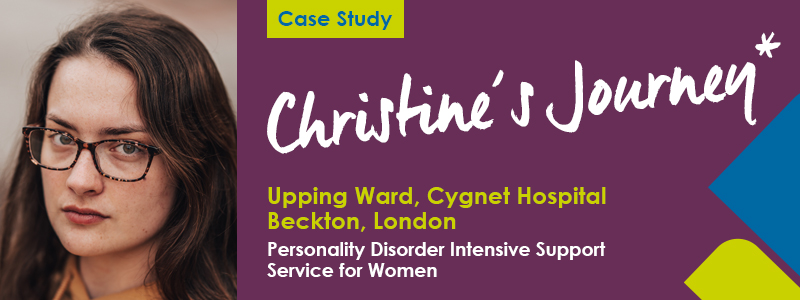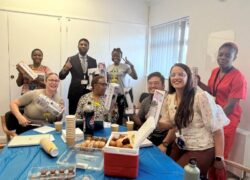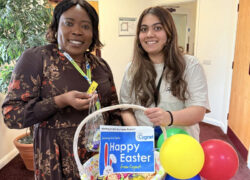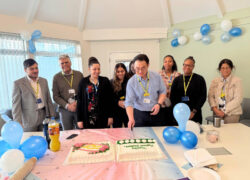
Christine’s history
Christine* was raised by parents who were unavailable or emotionally distant and suffered with depression and alcohol/substance misuse. She had a good relationship with her father, but her relationship with her mother was turbulent. Christine recalls her mother was more incommunicative and angry, leaving her confused.
Christine did well academically, but as she developed a troubled relationship with food, worsened by her mother’s own eating disorder – she tried to restrict her intake to avoid weight gain and remembers being made to eat food that made her vomit. At university she struggled to connect with others. Through her twenties Christine struggled increasingly with self-harm and disordered eating.
Once her sister had moved away, Christine’s emotional connections were solely with those suffering psychiatric vulnerabilities like hers. Her self-harm and suicidality worsened and Christine required hospitalisation to manage the risk. The resulting weight loss was not a problem for Christine in itself but her feelings of despair were now overwhelming, leading to several attempts at suicide.
In 2019 Christine moved to an inpatient unit for people with Emotionally Unstable Personality Disorder (EUPD) where the risks around her presentation were managed by continuous 1-to-1 observations, with a support worker by her side 24 hours per day. During this time she regularly absconded in order to end her life.
She formed attachments with staff and learnt to sooth herself when distressed, but the underlying turmoil was never too far from the surface, ready to overwhelm her again.
When Christine came to us
For three years Christine had been on continuous 1-to-1 observations when local commissioners decided to bring her closer to home for a new start. She was severely depressed in addition to her EUPD, feeling she had no future and would never feel happiness again. Her Dad, with whom she had remained close, had died, and she was carer to her mum, who remained unpredictable, invalidating and critical. Christine’s primary attachment needs had never really been met and she had no established sense of identity.
It appeared to the Multi-Disciplinary Team (MDT) on Upping Ward on meeting her that, despite the chronicity of her symptoms, Christine was ready for change. They became aware of the need for the staffing team to be able to embrace Christine’s needs, to validate and support her, but also to challenge her when needed. It was the team’s willingness to acknowledge these differences between themselves and with Christine that led her to feel here was an opportunity to develop the more authentic, integrated sense of self that had previously always eluded her.
Christine’s care
An early opportunity arose to test Christine’s readiness for change. She wanted to see her family home again before it was sold. It was only a few weeks into her admission, but the team opted to support her home leave, offering Christine a powerful experience of being listened to and her experience validated, as long as she committed to talking honestly about her feelings. When on leave she fell into a familiar pattern of relationships that left her feeling hopeless and suicidal.
The Upping Ward MDT believed there were bound to be stumbles along the road to recovery for individuals emerging from a lifetime stuck in the sort of unhelpful patterns Christine experienced. Rather than letting a lapse become a relapse, they treated it as an opportunity to enhance self-awareness and insight. Accordingly Christine was praised for disclosing what happened on leave rather than rebuked for the feelings behind her action or put on further 1-to-1 observations.
“You have always been direct and honest with me, and held hope for me throughout my stay.”
Christine’s wider family were encouraged into ward rounds as active participants in the journey Christine had embarked on. Conversations between the team, Christine’s family and Christine were successful. Trust built quickly, and as treatment progressed the focus of intervention moved from psychology to occupational therapy, in order to help Christine develop skills, interests and routines that supported the life she wanted to live.
She swam, walked, contributed much to the hospital newsletter, cooked and started driving again. On occasion she still self-harmed but Christine was challenged by the team’s lead psychiatrist, whose constant efforts to challenge and empower her were pivotal. This was acknowledged in psychology sessions as positive, again validating her feelings and responses at the same time as drawing boundaries.
Christine today
Christine was recently discharged home to the smallholding her remaining family own, with her own annexe. She enjoys walking her dog and is excited at the prospect of looking after the chickens and kittens. One of a number of symbolic acts of departure from Upping Ward was to visit a nearby garden centre alongside staff she was close to. They bought lavender and other plants, to re-pot in an old gravy jug and other vessels that had strong sentimental value for Christine. She enjoyed the thought of new life being able to flourish in an old container.
“You have helped me achieve a happiness about being alive that I never thought possible. Thank you for my bright and golden future.”
Christine is characteristically now able to allow herself to feel difficult emotions but somehow let them quickly transform into positives. She still feels anxious but looks forward to the future, as she described beautifully in a homemade and embroidered card she sent the team. We would like to wish Christine all the best for the future.
*Name has been changed to protect their identity




